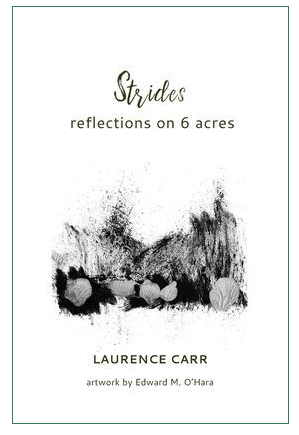Laurence Carr held too many jobs over the decades: Golf Caddy; The Popcorn King at Kennywood Amusement Park; painter (walls and fences); answered phones at numerous NYC businesses (was hastily dismissed for not knowing everything about the companies); actor (a modest career but got to play Lubbock, TX); a goal was to be a geek in a mid-western sideshow but my career swerved; theatre director, artistic director, playwright, mentor of creative and dramatic writer; editor; woods wanderer...
Can you tell us about a job you had early in your writing career that stands out in your memory?
Working at the amusement park was a defining moment, and the time and place I started writing in earnest. It was a place of multiple realities, layers, and masks. Perfect for the writer to immerse into.
Many emerging writers are looking for the moment when they "made it." What are your thoughts on "making it"
A writer/artist creates themselves, and one is always a work in progress.
What were some of your biggest challenges along your writing/publishing path?
As Dorothy Parker said, "Writing is rewriting." Many pieces are not finished, simply abandoned. But hopefully revisited...
What advice would you give to writers/artists today who are "moonlighting" in order to support their art?
A moonlighting job is most valuable. It's the place the writer observes, makes notes and gathers all the info for the later pieces. It is a huge storehouse of knowledge.
What inspires your writing?
The things I hear, see and read. Stay open to everything; don't judge too quickly.
READ LAURENCE CARR’S LATEST:
Laurence Carr is a Hudson Valley writer, editor and educator. His books include: Strides, reflections on 6 acres with artist Edward O’Hara; Traverse, with artist Power Boothe; Paradise Loft (poems) co-published by Lightwood Press/CAPS Press; Threnodies and The Wytheport Tales from Codhill Press, where he edited four anthologies, including A Slant of Light, Contemporary Women Writers of the Hudson Valley, winner of the USA Best Book Award for Fiction Anthology. The novel, Pancake Hollow Primer, (Codhill Press), won a Next Generation Indie Book Award. He taught creative and dramatic writing for 24 years at SUNY New Paltz (NY). He’s widely published, and his plays have been produced throughout the U.S and Europe. He is publisher and writer for Lightwood, a magazine of arts and culture at Lightwoodpress.com. Also visit at www.carrwriter.com.


